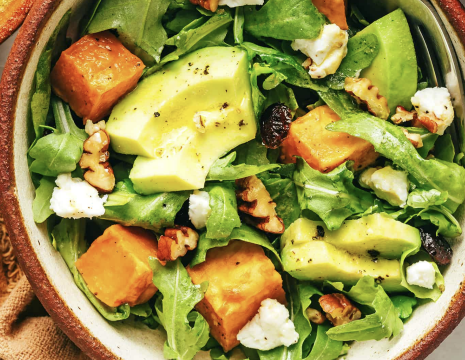Issue #248: Feed Your Brain
Good morning. It’s Thursday, October 5th.
Today’s Quick Win
From the Lab: Progressive Brain Hacks
Speed Read: 3D-Printed Brain
Thursday Night In: Feel-Good Fall Salad
“Metabolism is converting everything we eat into everything we are.”
The percentage of individuals over the age of 65 that will die with Alzheimer’s Disease or another form of dementia. (Source)
From the Lab
On Tuesday (Issue #247), we reported on the proven tactics to prevent and fight against cognitive decline - like exercise to boost our nitric oxide (NO).
Today, we’re talking about three more progressive (and less proven) potential therapies that might be huge in the fight against Alzheimer’s.
Creatine
We already shared studies that show creatine improves our memory and cognitive thinking (Issue #152).
Everyone from Steven Gundry to Andrew Huberman to Brad Stanfield to Rhonda Patrick to Peter Attia actively promote creatine supplements.
The boost in brain function actually facilitates the glucose (fuel) uptake in the brain and turns down oxidative stress - basically it feeds the brain and reduces inflammation.
This might actually be powerful enough to fend off Alzheimer’s Disease and dementia. This connection has mostly been studied in mice, but more to come here.
Personal Note: I find that if I take 5g of creatine daily I gain too much mass and only put a scoop in my smoothie on days when I do heavy lifting (2x per week).
Light Therapy
There are more and more uses of light therapy for our longevity - one use just might be helping our brain.
Near infrared light is a laser that doesn’t cut the skin - but penetrates into our brain and cells to help stimulate our lymphatic system to clean out the amyloid plaque on the brain and to also boost glucose (it all comes down to the brain getting the fuel it needs as we age).
This isn’t a readily available therapy for everyone, but with more studies underway, it’s something that might become more mainstream to protect our brains.
Ketogenic Diet
This diet seems to always be shifting - everyone should do it; oh wait, no it’s overrated.
Chris Palmer (Harvard) has reignited interest with ketosis - not for weight loss - but for brain health. His recent book (Brain Energy) talks about how the diet can be the best medication for mental illness and disease.
It all comes back to the same concept of getting fuel to the brain. Those suffering from Alzheimer's can improve memory and strategic thinking if they can use ketones as an alternative fuel source to glucose. Through the low-carb diet, instead of glucose, the liver creates ketones that are consumed throughout the body.
We’ll continue to follow these and other progressive protocols for mental health as more studies are completed and the science is confirmed.
Thrive25 Partner Spotlight
We’re super pumped to partner with Momentous and give a 15% discount to all Thrive25 readers!!
Their products are backed with real scientific research, direct clinical proof, and patented ingredients. They work with the brightest minds - scientists as well as performance experts in the NFL, NBA, MLB and more - to develop world-class products and protocols for high-performance seekers at all levels.
Thrive25 subscribers get 15% off the entire product portfolio using code Thrive at checkout. Click HERE!
Speed Read
Health & Longevity in the News
3D Printing the Brain: It seems like you can 3D print almost anything nowadays. Let’s go ahead and add a brain to that list. Scientists in Australia printed a living neural network composed of rat brain cells. This could have major ramifications in brain understanding and drug development without the need for animals. (WIRED)
77 Years to Eradicate Disease: That’s the goal of CZI, the charitable organization from Mark Zuckerberg and Priscilla Chan. How? Through technology of course. CZI has created the largest AI-driven computing cluster for non-profit study. The first step to scientific discovery? Creating single-cell datasets and visualizations to understand a cell’s lifecycle. (Learn more)
The Next James Bond: Researchers estimate there are ten million trillion trillion (10^31) bacteriophages, or phages - the most abundant biological entity on Earth. Phages are viruses that kill bacteria, and they’ve been perfecting the art of war since bacteria evolved 4 billion years ago. (Big Think)
Thursday Night In | Feel-Good Fall Salad
Max’s family had this salad last week to kick off fall, and it did not disappoint. A harmonious blend of earthy arugula, rich avocado, the natural sweetness of roasted sweet potatoes and crunch of pecans - this dish captures the heart of the season in every bite. Embrace the flavors of the season!
Pro Tip: Max isn’t a huge fan of goat cheese, but it blended perfectly in the salad. Like a different cheese - try feta or blue. And don’t forget Zero Acre Farms (use code THRIVE25 for 15% off) for cultured oil that tastes great!
Thanks for joining us today!
Check out the latest workout videos on our YouTube channel
Got feedback, recommendations or stories to share? Tell us what’s on your mind here
Want this direct to your inbox? Sign up here
Why Thrive25
We’re 40-something dads that felt our bodies and minds start to slow down and we’re not ready for that. We found too much information on every subject. So we started Thrive25 to transform what we’ve learned into something useful for the rest of us to spend just 3-5 min a day to optimize our health & longevity.
This newsletter is for you and we truly value your feedback. Never hesitate to reach out to us at team@thrive25.com.
To health!
Sign up for free:
The information in this newsletter is for informational purposes only and may not be appropriate or applicable based on your individual circumstances. Thrive25 Labs LLC does not provide medical, professional, or licensed advice. Please connect with your healthcare professional for medical advice specific to your health needs.









